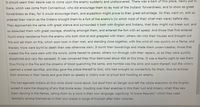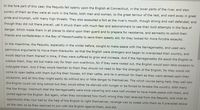Question
According to this document, who was the first to attack?
1)The English
2)The Narragansett
3)The Pequots

Transcribed Image Text:It should seem their desire was to come upon the enemy suddenly and undiscovered. There was a bark of this place, newly put in
there, which was come from Connecticut, who did encourage them to lay hold of the Indians' forwardness, and to show as great
forwardness as they, for it would encourage them, and expedition might prove to their great advantage. So they went on, and so
ordered their march as the Indians brought them to a fort of the enemy's (in which most of their chief men were) before day.
They approached the same with great silence and surrounded it both with English and Indians, that they might not break out; and
so assaulted them with great courage, shooting amongst them, and entered the fort with all speed. And those that first entered
found sharp resistance from the enemy who both shot at and grappled with them; others ran into their houses and brought out
fire and set them on fire, which soon took in their mat; and standing close together, with the wind all was quickly on a flame, and
thereby more were burnt to death than was otherwise slain; It burnt their bowstrings and made them unserviceable; those that
scaped the fire were slain with the sword, some hewed to pieces, others run through with their rapiers, so as they were quickly
dispatched and very few escaped. It was conceived they thus destroyed about 400 at this time. It was a fearful sight to see them
thus frying in the fire and the streams of blood quenching the same, and horrible was the stink and scent thereof; but the victory
seemed a sweet sacrifice, and they gave the praise thereof to God, who had wrought so wonderfully for them, thus to enclose
their enemies in their hands and give them so speedy a victory over so proud and insulting an enemy.
The Narragansett Indians all this while stood round about, but aloof from all danger and left the whole execution to the English,
except it were the stopping of any that broke away. Insulting over their enemies in this their ruin and misery, when they saw
them dancing in the flames, calling them by a word in their own language, signifying "O brave Pequots!" which they used
familiarly among themselves in their own praise in songs of triumph after their victories.

Transcribed Image Text:In the fore part of this year, the Pequots fell openly upon the English at Connecticut, in the lower parts of the river, and slew
sundry of them as they were at work in the fields, both men and women, to the great terrour of the rest, and went away in great
pride and triumph, with many high threats. They also assaulted a fort at the river's mouth, though strong and well defended; and
though they did not there prevail, yet it struck them with much fear and astonishment to see their bold attempts in the face of
danger. Which made them in all places to stand upon their guard and to prepare for resistance, and earnestly to solicit their
friends and confederates in the Bay of Massachusetts to send them speedy aid, for they looked for more forcible assaults.
In the meantime, the Pequots, especially in the winter before, sought to make peace with the Narragansetts, and used very
pernicious arguments to move them thereunto: as that the English were strangers and began to overspread their country, and
would deprive them thereof in time, if they were suffered to grow and increase. And if the Narragansetts did assist the English to
subdue them, they did but make way for their own overthrow, for if they were rooted out, the English would soon take occasion to
subjugate them. And if they would hearken to them they should not need to fear the strength of the English, for they would not
come to open battle with them but fire their houses, kill their cattle, and lie in ambush for them as they went abroad upon their
occasions; and all this they might easily do without any or little danger to themselves. The which course being held, they well saw
the English could not long subsist but they would either be starved with hunger or be forced to forsake the country. With many
the like things; insomuch that the Narragansetts were once wavering and were half minded to have made peace with them, and
joined against the English. But again, when they considered how much wrong they had received from the Pequots, and what an
opportunity they now had by the help of the English to right themselves; revenge was so sweet unto them as it prevailed above
all the rest, so as they resolved to join with the English against them, and did.
Expert Solution
This question has been solved!
Explore an expertly crafted, step-by-step solution for a thorough understanding of key concepts.
This is a popular solution
Trending nowThis is a popular solution!
Step by stepSolved in 2 steps
